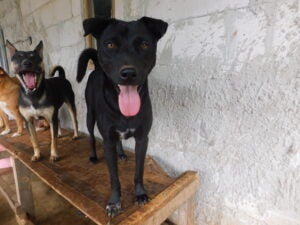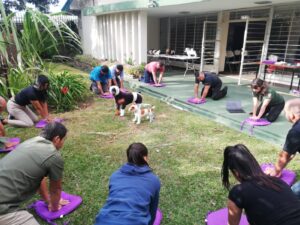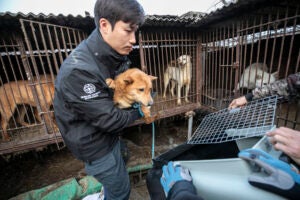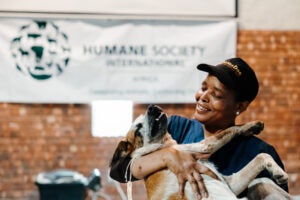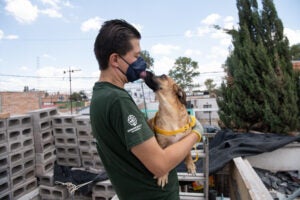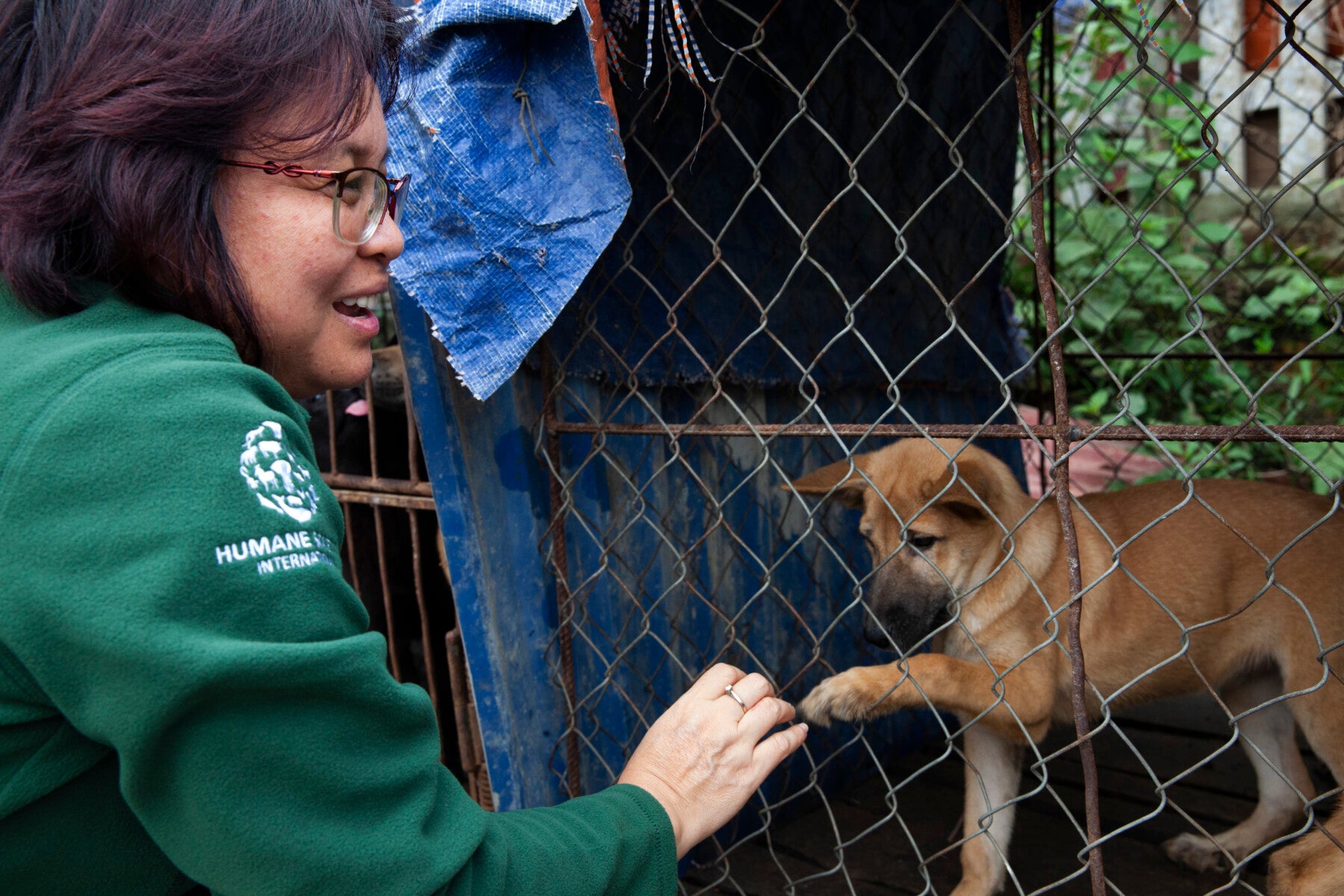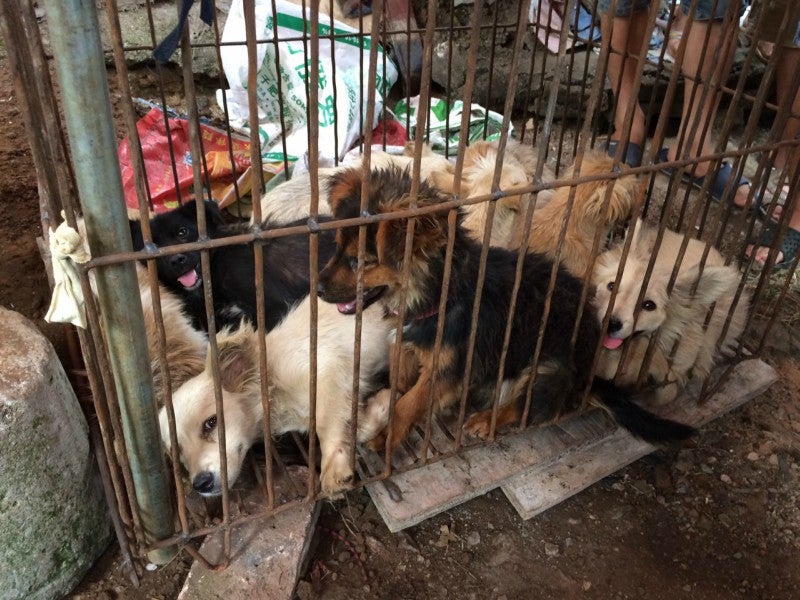
The ‘Yulin Lychee and Dog Meat Festival’ was launched in 2009/2010 by dog meat traders in the city of Yulin, in the Guangxi Zhuang Autonomous Region of China as a commercial venture to boost their dwindling sales. The term “festival” is misleading; in truth there is very little about this week in June that would be recognisable as festivities or celebration. Dogs and cats are killed for meat all year round in Yulin, so the “festival” is really just a week-long escalation of what is an everyday trade in the city.
It takes place every year, starting on June 21 (the summer solstice), during which traders make extra efforts to promote dog meat to local and visiting consumers. Larger than usual volumes of dogs (and other animals) are trafficked into Yulin at this time for slaughter and sale.
Local officials initially endorsed the event, expecting it to attract tourists and boost local development. On the contrary, the festival has been a PR disaster for Yulin, earning national and international condemnation for the annual mass dog slaughter, and the local authorities have disassociated themselves with the event since 2014.
At its height, as many as 10-15,000 dogs were killed for their meat in Yulin during this period, mostly trafficked into the city by trucks sourcing dogs from across China. More recently, as a direct result of national and global pressure, far fewer dogs have been killed during the core days of 20-22 June, now estimated to be around 3,000 -5,000 dogs over these days.
Human health risks of the dog meat trade
The dog meat trade poses a significant risk to human health via the capture, trade, slaughter and processing of dogs and their carcasses. The World Health Organization has warned of the role the dog meat trade plays in facilitating the spread of diseases such as cholera and the deadly rabies virus which kills around 53,000 people across Asia annually, given that it encourages the long distance trafficking of huge numbers of dogs of unknown disease and vaccination status. In China, the dog meat trade breaches rabies control measures, undermining China’s efforts to eliminate this deadly disease. Guangxi province, where Yulin is situated, is amongst China’s five worst affected areas for human rabies, and Yulin was once among China’s 10 worst affected cities for human rabies cases. Dogs shipped to Yulin come from as far as Anhui, Hubei, Henan, Hebei in Central and North China, more than 1,500 miles away.
Making progress in stopping the Yulin dog meat festival
- In 2010, the Yulin “festival” was launched. Around 15,000 dogs were killed for the festival in scenes that saw participants feasting in the streets. But by 2014, the Yulin authorities realised that endorsing the festival was a bad idea, and they issued an internal warning to all government employees and families not to attend dog meat restaurants. The Yulin authorities distanced themselves from the festival, saying it was a private business event, shut down one live dog market, and closed most dog slaughter operations in the city’s urban center. This led to a drastic reduction in the number of dogs slaughtered that year, however more dogs are still slaughtered during the Summer Solstice day.
- In 2015 officials ordered all Yulin restaurants to remove tables from outside their premises and, for the second year running, to reduce dog meat dishes. Big public displays of mass dog meat eating were forbidden in recognition that this was likely to lead to conflict. Yulin’s Dong Kou Market had noticeably fewer dog meat stands.
- In 2016 the Yulin authorities implemented road blocks to prevent trucks loaded with dogs and cats from entering the city. However they did so only a day or so prior to the festival, after most animals had already been offloaded at slaughterhouses in places outside the city center.
- In 2017 the Yulin authorities announced to dog meat traders that a ban on the sale of dog meat would be imposed that year from June 15th, with heavy fines. However, a few days later the ban was lifted after the dog meat traders threatened civil unrest. A 2017 survey revealed that even in Yulin, home of the notorious dog meat festival, most people (72%) don’t regularly eat dog meat despite efforts by dog meat traders to promote it.
- In 2018 local campaigners estimated that around 3,000 dogs were killed during the core festival days.
- In 2020 during the nationwide COVID-19 pandemic lockdown, catering businesses were evidently restricted and domestic tourism came to a standstill. Chinese activists observed that most of the dog meat stalls and shops previously scattered around the city had been consolidated into one central area called Nanchao market on the outskirts of Yulin. Yulin’s notorious Dongkou market that was once the epicentre of dog meat sales and the slaughter of live dogs, appeared relatively empty by comparison. HSI believes that centralizing dog meat trade activity could be the authorities’ attempt to make it easier to monitor and manage.
- In March 2020, the city of Shenzhen, followed soon after by Zhuhai, announced that dogs and cats are not food animals and imposed a ban on their sales for food. This legislative decision by two of mainland China’s most modern and progressive cities added pressure for cities that still allow the controversial trade.
- In April 2020 the Chinese national government (Ministry of Agriculture and Rural Affairs) made a public statement explicitly stating that dogs are considered companion animals and not “livestock”, stating: “With the progress of human civilization and the public’s concern and preference for animal protection, dogs have changed from traditional domestic animals to companion animals. Dogs are generally not regarded as livestock and poultry around the world, and China should also not manage them as livestock and poultry.”
These initial steps are commendable, but more proactive and decisive steps are needed to end this cruel trade.

